Kia Ceed vs Skoda Superb Combi – Performance, range & efficiency compared
Everyday use, family trips or long-distance drives – here’s where the differences show.
Discover whether Kia Ceed or Skoda Superb Combi fits your lifestyle better.
Costs and Efficiency:
Looking at overall running costs, both models reveal some interesting differences in everyday economy.
Kia Ceed has a convincingly advantage in terms of price – it starts at 23500 £, while the Skoda Superb Combi costs 35200 £. That’s a price difference of around 11751 £.
Fuel consumption also shows a difference: Skoda Superb Combi manages with 0.40 L and is therefore significantly more efficient than the Kia Ceed with 6 L. The difference is about 5.60 L per 100 km.
Engine and Performance:
Under the bonnet, it becomes clear which model is tuned for sportiness and which one takes the lead when you hit the accelerator.
When it comes to engine power, the Skoda Superb Combi has a decisively edge – offering 265 HP compared to 140 HP. That’s roughly 125 HP more horsepower.
In acceleration from 0 to 100 km/h, the Skoda Superb Combi is decisively quicker – completing the sprint in 5.70 s, while the Kia Ceed takes 9.50 s. That’s about 3.80 s faster.
In terms of top speed, the Skoda Superb Combi performs clearly perceptible better – reaching 250 km/h, while the Kia Ceed tops out at 197 km/h. The difference is around 53 km/h.
There’s also a difference in torque: Skoda Superb Combi pulls evident stronger with 400 Nm compared to 253 Nm. That’s about 147 Nm difference.
Space and Everyday Use:
Whether family car or daily driver – which one offers more room, flexibility and comfort?
Both vehicles offer seating for 5 people.
In curb weight, Kia Ceed is noticeable lighter – 1298 kg compared to 1575 kg. The difference is around 277 kg.
In terms of boot space, the Skoda Superb Combi offers convincingly more room – 690 L compared to 395 L. That’s a difference of about 295 L.
In maximum load capacity, the Skoda Superb Combi performs noticeable better – up to 1920 L, which is about 629 L more than the Kia Ceed.
When it comes to payload, Skoda Superb Combi slightly takes the win – 584 kg compared to 490 kg. That’s a difference of about 94 kg.
Who wins the race?
The Skoda Superb Combi proves to be wins the duel decisively and therefore becomes our DriveDuel Champion!
Skoda Superb Combi is the better all-rounder in this comparison.
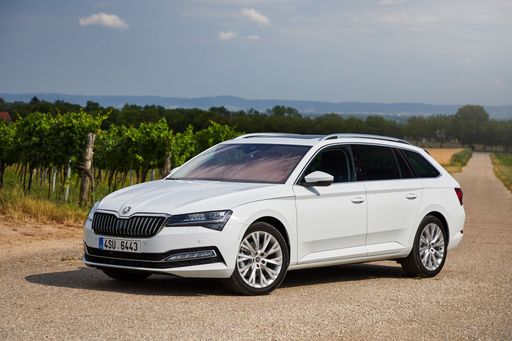
Skoda Superb Combi
Kia Ceed
The Kia Ceed stands out in the compact car segment with its sleek design and impressive handling. It offers a comfortable and well-equipped interior that appeals to both drivers and passengers. With its efficient engine options, the Ceed provides a smooth and enjoyable driving experience suitable for city commutes and longer journeys alike.
details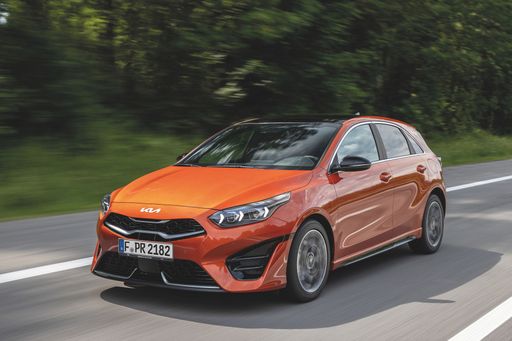 @ press.kia.com
@ press.kia.com
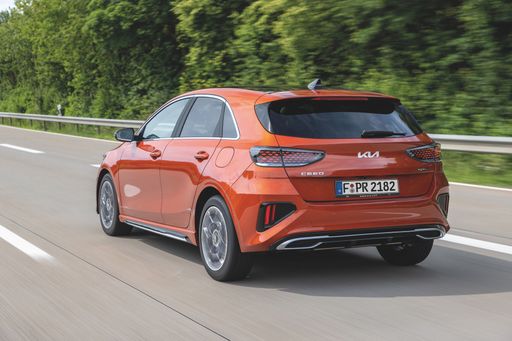 @ press.kia.com
@ press.kia.com
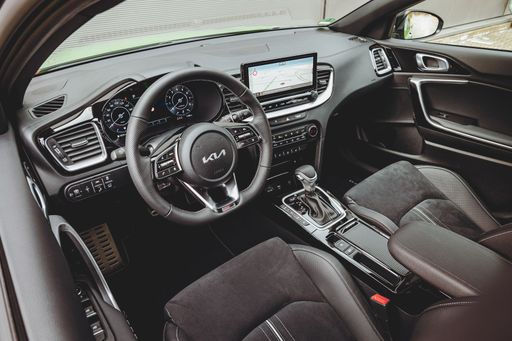 @ press.kia.com
@ press.kia.com
Skoda Superb Combi
The Škoda Superb Combi combines practicality and elegance, making it a popular choice for families and professionals alike. Its spacious interior offers exceptional comfort and ample storage, suitable for long journeys and everyday errands. Additionally, the refined design and advanced technology features ensure a sophisticated driving experience.
details @ Skoda Presse Deutschland
@ Skoda Presse Deutschland
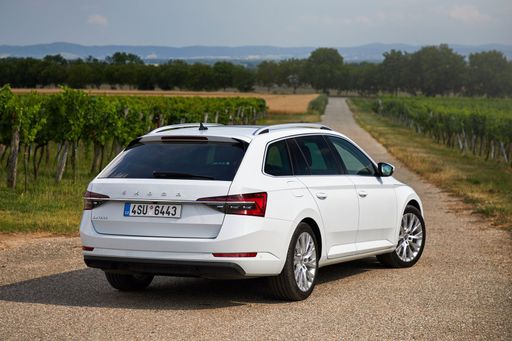 @ Skoda Presse Deutschland
@ Skoda Presse Deutschland

|

|
|
|
|
Costs and Consumption |
|
|---|---|
|
Price
23500 - 26300 £
|
Price
35200 - 51000 £
|
|
Consumption L/100km
6 - 6.4 L
|
Consumption L/100km
0.4 - 7.8 L
|
|
Consumption kWh/100km
-
|
Consumption kWh/100km
-
|
|
Electric Range
-
|
Electric Range
124 - 134 km
|
|
Battery Capacity
-
|
Battery Capacity
19.70 kWh
|
|
co2
137 - 146 g/km
|
co2
8 - 178 g/km
|
|
Fuel tank capacity
50 L
|
Fuel tank capacity
45 - 66 L
|
Dimensions and Body |
|
|---|---|
|
Body Type
Hatchback
|
Body Type
Estate
|
|
Seats
5
|
Seats
5
|
|
Doors
5
|
Doors
5
|
|
Curb weight
1298 - 1372 kg
|
Curb weight
1575 - 1853 kg
|
|
Trunk capacity
357 - 395 L
|
Trunk capacity
510 - 690 L
|
|
Length
4315 mm
|
Length
4902 mm
|
|
Width
1800 mm
|
Width
1849 mm
|
|
Height
1447 mm
|
Height
1482 mm
|
|
Max trunk capacity
1253 - 1291 L
|
Max trunk capacity
1770 - 1920 L
|
|
Payload
478 - 490 kg
|
Payload
497 - 584 kg
|
Engine and Performance |
|
|---|---|
|
Engine Type
Petrol, Petrol MHEV
|
Engine Type
Plugin Hybrid, Petrol, Petrol MHEV, Diesel
|
|
Transmission
Manuel, Automatic
|
Transmission
Automatic
|
|
Transmission Detail
Manual Gearbox, Dual-Clutch Automatic
|
Transmission Detail
Dual-Clutch Automatic
|
|
Drive Type
Front-Wheel Drive
|
Drive Type
Front-Wheel Drive, All-Wheel Drive
|
|
Power HP
100 - 140 HP
|
Power HP
150 - 265 HP
|
|
Acceleration 0-100km/h
9.5 - 13.2 s
|
Acceleration 0-100km/h
5.7 - 9.3 s
|
|
Max Speed
178 - 197 km/h
|
Max Speed
220 - 250 km/h
|
|
Torque
172 - 253 Nm
|
Torque
250 - 400 Nm
|
|
Number of Cylinders
3 - 4
|
Number of Cylinders
4
|
|
Power kW
74 - 103 kW
|
Power kW
110 - 195 kW
|
|
Engine capacity
998 - 1482 cm3
|
Engine capacity
1498 - 1984 cm3
|
General |
|
|---|---|
|
Model Year
2024
|
Model Year
2024 - 2025
|
|
CO2 Efficiency Class
E
|
CO2 Efficiency Class
B, E, F, D, G
|
|
Brand
Kia
|
Brand
Skoda
|
What drivetrain options does the Kia Ceed have?
The Kia Ceed is available as Front-Wheel Drive.
The prices and data displayed are estimates based on German list prices and may vary by country. This information is not legally binding.
